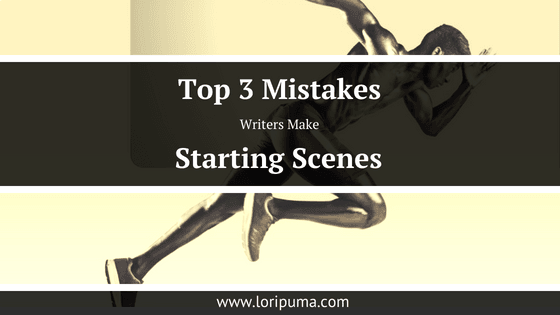Top Three Mistakes Writers Make Starting Scenes
/This past April and May, I read over 100 short stories as a judge in The Write Practice's Spring Short Story Contest. I kept track of how often I gave feedback on different writing and storytelling concepts. This post is the second in a series on common scene-writing mistakes. Read Part 1.
The Inciting Incident is the first step to creating tension and intriguing readers
Every scene starts with an Inciting Incident — an event that upsets the balance of your protagonist’s life and forces your character to act.
The Inciting Incident establishes the starting value for the change that happens in your scene. As we learned last time, every scene has a change called a life value shift. Scenes that don’t have an Inciting Incident, don’t change from beginning to end. They’re missing a life value shift and they’re unlikely to keep a reader’s attention.
It's hard to talk about what makes a good Inciting Incident. It's much easier to contrast good Inciting Incidents with bad Inciting Incidents. Here are three mistakes writers make in crafting the Inciting Incident of a scene and good/bad examples.
Mistake #1. Inciting Incident doesn’t force the protagonist to face new conflict.
An Inciting Incident must not only upset the balance of your protagonist’s life and force them to face conflict unlike what they’ve previously experienced. For example, consider a story where a single mom gets a new job. Imagine she gets a job at a new company, but she gets a similar paycheck and faces similar challenges as at her last job. This is not an Inciting Incident. There’s no new conflict here.
Contrast the Inciting Incident above, with this version. A single mom, who's also a veteran bus driver, is offered a new job driving for a company with an abysmal safety history. They’re willing to pay her double her current salary. As long as she’s willing to drive under constant video surveillance and take part in driver training on a weekly basis. She’s willing to do anything to help her son go to college. The Inciting Incident shows her signing the job offer without asking questions.
This is an Inciting Incident. Even though the protagonist is doing a similar job as before, her life is changing in meaningful ways. She’s making a lot more money, but at what cost? Readers will turn the page to find the answer to that question.
Mistake #2. Inciting Incident happens after too many words.
Inciting Incidents should happen within the first few lines of a scene. When you delay an Inciting Incident you risk losing your reader’s attention. For writers who working on their first novel, I recommend keeping your Inciting Incident within the first few lines of a scene, even if you're writing in a genre such as Fantasy or Literary Fiction, where readers may be more patient.
Mistake #3. Inciting Incident is a situation, not a specific moment.
An Inciting Incident describes a character’s action as it occurs. You can pinpoint the Inciting Incident on a timeline. It's possible to mark what is 'before' and what is 'after'. We show an event as it happens in order to establish a strong emotional bond between the reader and the protagonist.
For example, let’s go back to the single mom bus driver story. Imagine we’re writing a scene about the mom in September. It starts with narration that tells us she's working for a company with a lax attitude toward safety. This is a situation. Contrast that with this specific moment: At her job interview, she asks the hiring manager about how the company is addressing safety. He responds with a twinkle in his eye: "Our highest value is teamwork. You'll be perfectly safe if you remember whose team you're on." This is a specific moment. The protagonist's life changes with this dialogue.
Start your scene so it builds the bond between reader and protagonist
Start your scenes with a bang. Don’t describe what happened to your protagonist a few months or even a few hours ago. Show readers the new challenge the protagonist is facing in this moment in the first few lines. Your readers will be dying to know what happens next.










